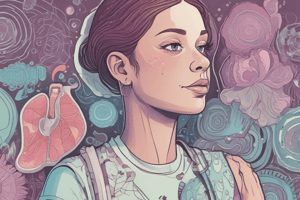Podcast
Questions and Answers
What is asthma?
What is asthma?
Reversible chronic airway inflammation and bronchoconstriction characterized by 1) respiratory symptoms and 2) variable expiratory airflow
What are some examples of things that can trigger asthma symptoms? (Select all that apply)
What are some examples of things that can trigger asthma symptoms? (Select all that apply)
- Exercise (correct)
- Viral infections (correct)
- Stress (correct)
- Laughter (correct)
- Cough (correct)
- Irritant exposure (correct)
- Medications (aspirin, NSAIDs, non-selective beta-blockers) (correct)
- Allergens (dust, pollen, pet dander, etc.) (correct)
When does asthma typically onset?
When does asthma typically onset?
Childhood-to-early life
Asthma symptoms are consistent from day to day.
Asthma symptoms are consistent from day to day.
Asthma symptoms are worse at night and early morning.
Asthma symptoms are worse at night and early morning.
What is the main cause of asthma?
What is the main cause of asthma?
The cough associated with asthma is usually productive.
The cough associated with asthma is usually productive.
Asthma is irreversible.
Asthma is irreversible.
What is the cornerstone of asthma treatment?
What is the cornerstone of asthma treatment?
What peak flow meter measurement indicates the "Green Zone" in an asthma action plan?
What peak flow meter measurement indicates the "Green Zone" in an asthma action plan?
What peak flow meter measurement indicates the "Yellow Zone" in an asthma action plan?
What peak flow meter measurement indicates the "Yellow Zone" in an asthma action plan?
Flashcards
What is asthma?
What is asthma?
Reversible chronic airway inflammation and bronchoconstriction characterized by 1) respiratory symptoms and 2) variable expiratory airflow
What are some common asthma triggers?
What are some common asthma triggers?
Stress, allergens (dust, pollen, pet dander, etc.), cough, irritant exposure, exercise, viral infections, laughter, medications (aspirin, NSAIDs, non-selective beta-blockers)
When does asthma usually onset?
When does asthma usually onset?
Childhood-to-early life
How do asthma symptoms change?
How do asthma symptoms change?
Signup and view all the flashcards
When are asthma symptoms usually worse?
When are asthma symptoms usually worse?
Signup and view all the flashcards
What is the main cause of asthma?
What is the main cause of asthma?
Signup and view all the flashcards
Describe the cough in a person with asthma
Describe the cough in a person with asthma
Signup and view all the flashcards
Is asthma reversible or irreversible?
Is asthma reversible or irreversible?
Signup and view all the flashcards
What is the cornerstone of asthma treatment?
What is the cornerstone of asthma treatment?
Signup and view all the flashcards
What is the Green Zone in an Asthma Action Plan?
What is the Green Zone in an Asthma Action Plan?
Signup and view all the flashcards
What is the Yellow Zone in an Asthma Action Plan?
What is the Yellow Zone in an Asthma Action Plan?
Signup and view all the flashcards
What is the Red Zone in an Asthma Action Plan?
What is the Red Zone in an Asthma Action Plan?
Signup and view all the flashcards
What happens when someone is in the Green Zone?
What happens when someone is in the Green Zone?
Signup and view all the flashcards
What happens when someone is in the Yellow Zone?
What happens when someone is in the Yellow Zone?
Signup and view all the flashcards
What happens when someone is in the Red Zone?
What happens when someone is in the Red Zone?
Signup and view all the flashcards
What is asthma?
What is asthma?
Signup and view all the flashcards
How can you manage asthma?
How can you manage asthma?
Signup and view all the flashcards
What are some common triggers for asthma?
What are some common triggers for asthma?
Signup and view all the flashcards
Is asthma a long-term condition?
Is asthma a long-term condition?
Signup and view all the flashcards
Study Notes
Asthma Description
- Asthma is a chronic, reversible condition involving airway inflammation and narrowing.
- Key characteristics include respiratory symptoms and fluctuating airflow.
Asthma Triggers
- Stress factors can exacerbate asthma.
- Allergens like dust, pollen, and pet dander trigger reactions.
- Coughing episodes can induce an asthma attack.
- Exposure to irritants worsens symptoms.
- Exercise can act as a trigger.
- Viral infections contribute to asthma episodes.
- Laughter and emotional responses can sometimes be triggers.
- Certain medications, such as aspirin and NSAIDs (non-steroidal anti-inflammatory drugs), as well as beta-blockers, can worsen asthma symptoms.
Asthma Onset
- Asthma typically develops in childhood or early life.
Asthma Symptoms Variability
- Asthma symptoms fluctuate significantly from day to day.
Asthma Nocturnal/Morning Symptoms
- Nighttime and early morning are often times of increased asthma symptoms.
Asthma Family History
- Family history often plays a role in the development of asthma.
Asthma Cough
- Asthma coughs are generally non-productive (dry).
Asthma Reversibility
- Asthma is a condition where symptoms are often reversible, meaning they can be improved or resolved with treatment and management.
Asthma Treatment Foundation
- Inhaled corticosteroids are a cornerstone of asthma treatment.
Asthma Action Plan - Green Zone
- The green zone of the asthma action plan represents peak flow readings 80-100% of a person's personal best, suggesting optimal lung function.
Asthma Action Plan - Yellow Zone
- Readings in the yellow zone indicate peak flow readings between 50-80% of a person's personal best, which signals a potential need to take action to prevent further worsening of asthma symptoms.
Asthma Action Plan - Red Zone
- The red zone, encompassing peak flow readings below 50% of a person's personal best, indicates a more critical situation and the need for immediate intervention, often hospitalization.
Studying That Suits You
Use AI to generate personalized quizzes and flashcards to suit your learning preferences.




